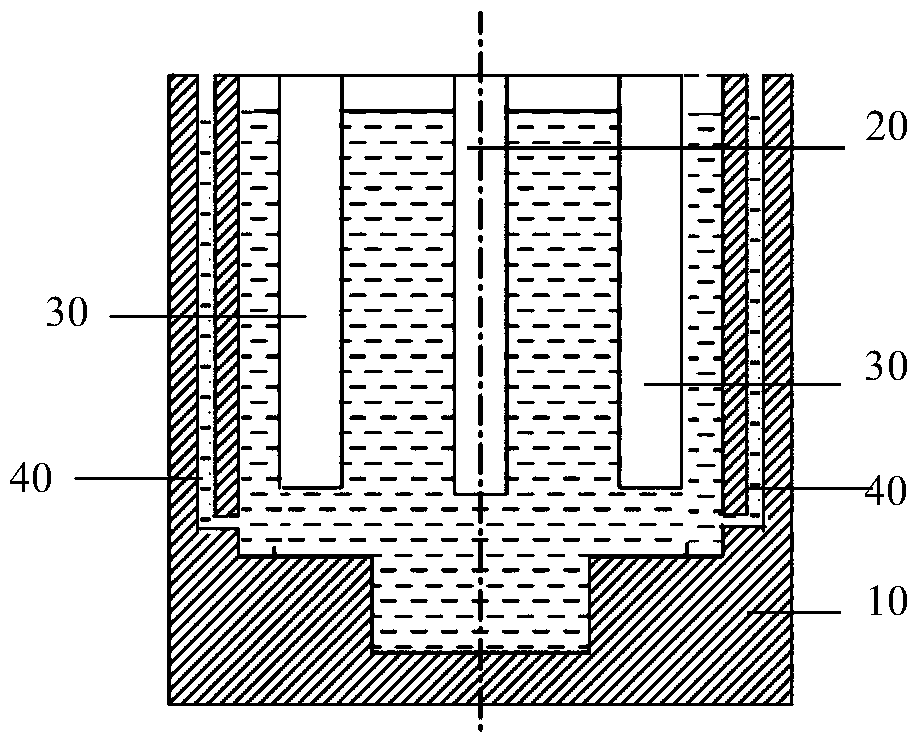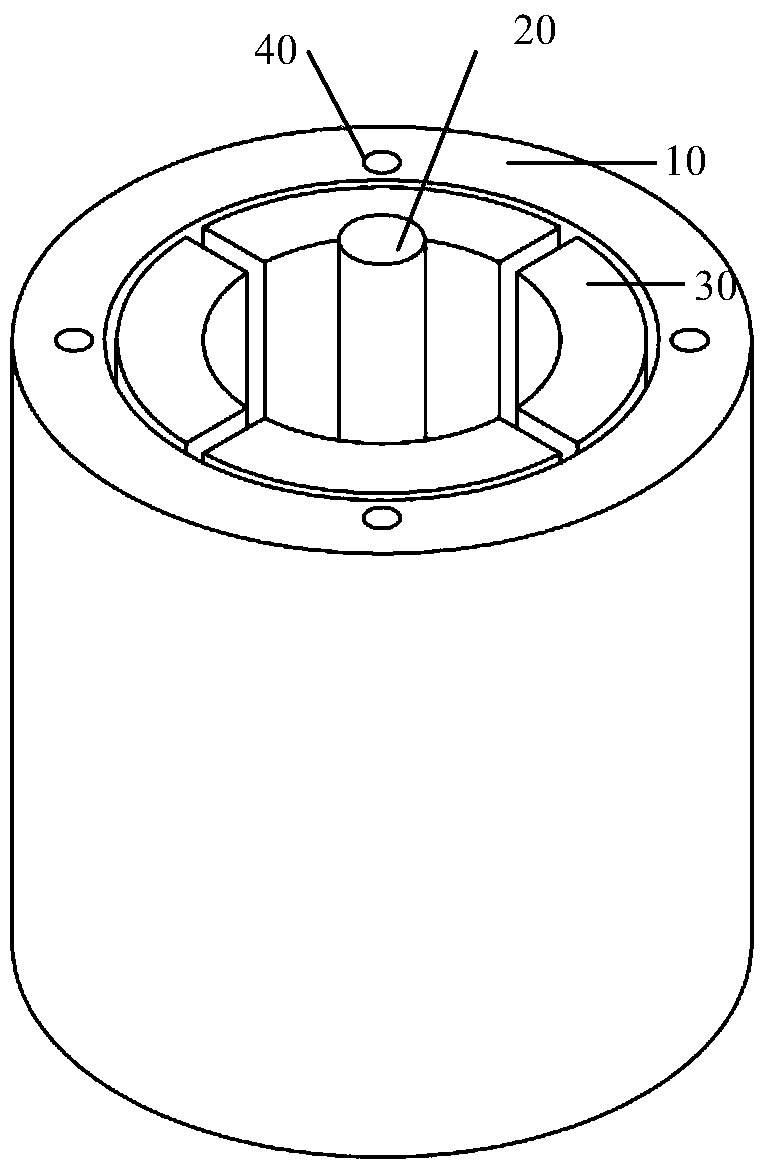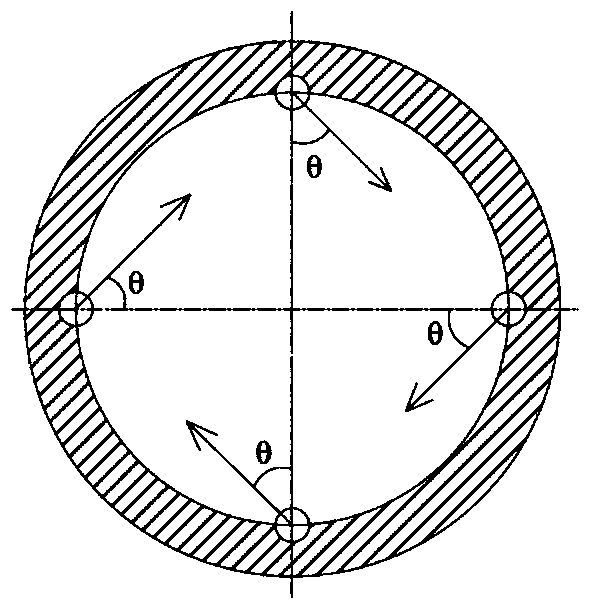Electrolysis device and electrolysis method
An electrolysis device and electrolysis method technology, applied in the field of electrolysis, can solve problems such as the flow dead zone of the electrolytic cell, and achieve the effects of enhancing heat transfer and mass transfer, uniform temperature and composition, and slowing down nodules
- Summary
- Abstract
- Description
- Claims
- Application Information
AI Technical Summary
Problems solved by technology
Method used
Image
Examples
Embodiment 1
[0063] Take NdF 3 and LiF mixture as a molten salt electrolyte, where NdF 3 The mass ratio to LiF is 7:1, graphite is used as anode, molybdenum rod is used as cathode, electrolysis is performed at 1050°C, the electrolysis voltage is 8.5V, air is introduced into the gas-liquid flow pipe every 0.5min, and the flow of gas is controlled 4.0×10 -5 m 3 / s, under the action of direct current, the added Nd 2 o 3 Nd in 3+ precipitated on the surface of the cathode. The metal droplets are formed and fall into the molybdenum crucible at the bottom of the electrolytic cell. After 2 hours of electrolysis, the metal droplets are scooped out and poured into the mold. No nodules were found at the bottom of the side wall of the furnace after working for 72 hours.
[0064] Main technical indicators: current efficiency is 88.0%, carbon content is 200 ppm, iron content is 500 ppm, and the service life of a single anode is 80~88h.
Embodiment 2
[0066] Take NdF 3 and LiF mixture as a molten salt electrolyte, where NdF 3 The mass ratio to LiF is 7:1, graphite is used as anode, molybdenum rod is used as cathode, electrolysis is performed at 1050°C, the electrolysis voltage is 8.5V, air is introduced into the gas-liquid flow pipeline every 30min, and the gas-liquid flow pipeline The gas flow control is 7.0×10 -5 m 3 / s, under the action of direct current, the added Nd 2 o 3 Nd in 3+ precipitated on the surface of the cathode. The metal droplets are formed and fall into the molybdenum crucible at the bottom of the electrolytic cell. After 2 hours of electrolysis, the metal droplets are scooped out and poured into the mold. The bottom of the side wall of the furnace body has not been found to have nodulation phenomenon after working for 100 hours.
[0067] Main technical indicators: current efficiency is 90.0%, carbon content is 190 ppm, iron content is 450 ppm, and the service life of a single anode is 96~104h.
Embodiment 3
[0075] to DyF 3 and LiF mixture as a molten salt electrolyte, where DyF 3 The mass ratio to LiF is 6:1, graphite is used as anode, iron rod is used as cathode, electrolysis is performed at 1080°C, the electrolysis voltage is 10.0V, air is introduced into the gas-liquid flow pipe every 10min, and the gas-liquid flow pipe The gas flow control is 5.0×10 -5 m 3 / s, under the action of direct current, the added Dy 2 o 3 Dy in 3+ It precipitates on the surface of the cathode and interacts with the iron cathode to form DyFe alloy droplets, which fall into the iron crucible at the bottom of the electrolytic cell. After 2 hours of electrolysis, the iron crucible is lifted out, and the alloy droplets obtained by electrolysis are poured into the mold. There was no nodulation at the bottom of the side wall of the furnace after working for 80 hours.
[0076] Main technical indicators: the current efficiency is 87%, the carbon content in the DyFe alloy is 180ppm, the mass percentage ...
PUM
| Property | Measurement | Unit |
|---|---|---|
| current efficiency | aaaaa | aaaaa |
| current efficiency | aaaaa | aaaaa |
| current efficiency | aaaaa | aaaaa |
Abstract
Description
Claims
Application Information
 Login to View More
Login to View More - R&D
- Intellectual Property
- Life Sciences
- Materials
- Tech Scout
- Unparalleled Data Quality
- Higher Quality Content
- 60% Fewer Hallucinations
Browse by: Latest US Patents, China's latest patents, Technical Efficacy Thesaurus, Application Domain, Technology Topic, Popular Technical Reports.
© 2025 PatSnap. All rights reserved.Legal|Privacy policy|Modern Slavery Act Transparency Statement|Sitemap|About US| Contact US: help@patsnap.com



